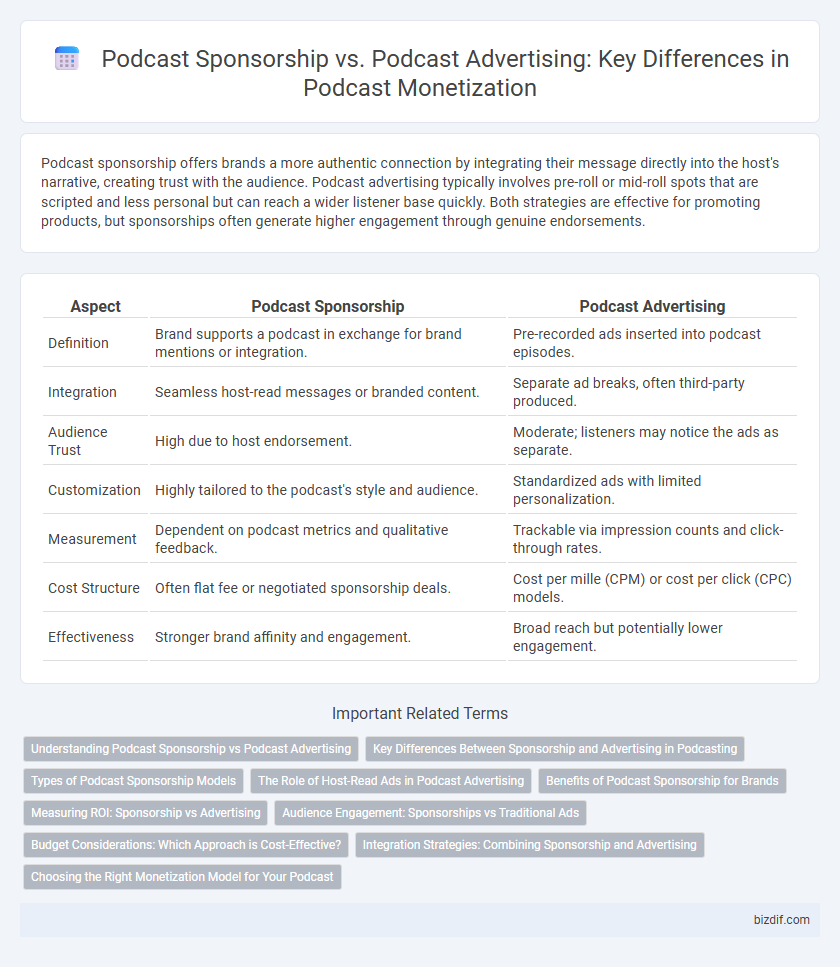Podcast sponsorship offers brands a more authentic connection by integrating their message directly into the host's narrative, creating trust with the audience. Podcast advertising typically involves pre-roll or mid-roll spots that are scripted and less personal but can reach a wider listener base quickly. Both strategies are effective for promoting products, but sponsorships often generate higher engagement through genuine endorsements.
Table of Comparison
| Aspect | Podcast Sponsorship | Podcast Advertising |
|---|---|---|
| Definition | Brand supports a podcast in exchange for brand mentions or integration. | Pre-recorded ads inserted into podcast episodes. |
| Integration | Seamless host-read messages or branded content. | Separate ad breaks, often third-party produced. |
| Audience Trust | High due to host endorsement. | Moderate; listeners may notice the ads as separate. |
| Customization | Highly tailored to the podcast's style and audience. | Standardized ads with limited personalization. |
| Measurement | Dependent on podcast metrics and qualitative feedback. | Trackable via impression counts and click-through rates. |
| Cost Structure | Often flat fee or negotiated sponsorship deals. | Cost per mille (CPM) or cost per click (CPC) models. |
| Effectiveness | Stronger brand affinity and engagement. | Broad reach but potentially lower engagement. |
Understanding Podcast Sponsorship vs Podcast Advertising
Podcast sponsorship involves a brand forming a long-term partnership with a podcast, often integrating the sponsor's message naturally into the content, while podcast advertising typically refers to shorter, transaction-based ads like pre-roll or mid-roll spots purchased for a specific campaign. Sponsorships foster deeper brand association and audience trust through host-read endorsements, whereas advertising relies on concise, targeted messaging to drive immediate calls to action. Understanding the distinction helps marketers optimize budget allocation by balancing engagement-driven sponsorships with scalable advertising placements.
Key Differences Between Sponsorship and Advertising in Podcasting
Podcast sponsorship involves a long-term partnership where the sponsor becomes an integral part of the show's identity, often featuring personalized host-read endorsements that build listener trust and brand loyalty. In contrast, podcast advertising typically consists of more transactional placements such as pre-roll, mid-roll, or post-roll ads that are less integrated and focus on direct response metrics like clicks and conversions. Sponsorships emphasize brand alignment and audience engagement, whereas advertising prioritizes measurable campaign performance and frequency.
Types of Podcast Sponsorship Models
Podcast sponsorship models primarily include host-read ads, branded segments, and product integrations, each offering varying levels of authenticity and engagement. Host-read ads leverage the podcast host's voice for a personalized appeal, while branded segments involve dedicated content aligned with the sponsor's message. Product integrations seamlessly blend the sponsor's offering into the podcast narrative, enhancing listener connection and brand recall.
The Role of Host-Read Ads in Podcast Advertising
Host-read ads in podcast advertising enhance authenticity and listener trust by delivering personalized endorsements that align with the show's content. These ads often lead to higher engagement and conversion rates compared to pre-produced spots due to the host's established connection with the audience. Podcast sponsorships, while broader in scope, complement host-read ads by integrating brand messaging throughout episodes, creating a cohesive promotional strategy.
Benefits of Podcast Sponsorship for Brands
Podcast sponsorship offers brands authentic audience engagement by integrating products naturally within content, enhancing trust and brand loyalty. Sponsors benefit from targeted demographics and higher listener retention compared to traditional advertising, leading to improved conversion rates. This partnership model fosters long-term relationships between brands and podcasts, amplifying brand authority and reach over time.
Measuring ROI: Sponsorship vs Advertising
Podcast sponsorship ROI is measured through long-term brand association and listener engagement metrics, often tracking increases in website traffic and social media interactions over extended campaigns. Podcast advertising ROI is typically evaluated with direct response metrics such as click-through rates, promo code usage, and immediate sales conversions, providing clearer short-term performance indicators. Comparing both approaches reveals sponsorship excels in brand loyalty and awareness, while advertising offers more precise and quantifiable returns on investment.
Audience Engagement: Sponsorships vs Traditional Ads
Podcast sponsorships create deeper audience engagement by seamlessly integrating the brand message into the host's authentic storytelling, fostering trust and loyalty. Traditional podcast advertising often consists of short, scripted commercials that interrupt the listening experience, resulting in lower listener retention and response rates. Data shows sponsorships can increase brand recall by up to 70%, compared to 30% for conventional ads, highlighting their superior impact on audience connection.
Budget Considerations: Which Approach is Cost-Effective?
Podcast sponsorships often provide more cost-effective long-term value by aligning brands with hosts for ongoing promotion, typically involving fixed fees or barter agreements. In contrast, podcast advertising usually requires higher upfront investment with pay-per-impression or pay-per-click models, suitable for short-term campaigns but potentially less efficient for tight budgets. Evaluating the target audience, campaign duration, and measurable ROI helps determine the optimal budget allocation between sponsorship and advertising.
Integration Strategies: Combining Sponsorship and Advertising
Podcast integration strategies blend sponsorship and advertising to maximize audience engagement and revenue potential. Sponsorships provide long-term brand alignment through host-read messages and episode mentions, while advertising delivers targeted, short-term promotions via dynamically inserted ads. Combining these approaches enhances listener trust and campaign effectiveness by balancing authenticity with reach.
Choosing the Right Monetization Model for Your Podcast
Choosing the right monetization model for your podcast hinges on understanding the differences between podcast sponsorship and podcast advertising. Podcast sponsorship typically involves a longer-term partnership with brands that align closely with your content and audience, fostering trust and authenticity. Podcast advertising, on the other hand, offers more flexible, short-term opportunities to monetize through pre-roll, mid-roll, or post-roll ads, allowing for diverse revenue streams based on episode performance and listener demographics.
Podcast sponsorship vs Podcast advertising Infographic

 bizdif.com
bizdif.com